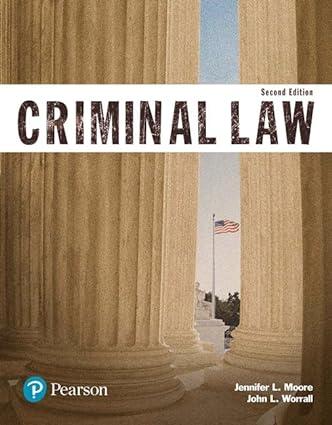At trial, the evidence showed defendant managed an escort service which advertised on the internet. An undercover
Question:
At trial, the evidence showed defendant managed an escort service which advertised on the internet. An undercover officer testified he scheduled a meeting with one of defendant’s escorts . . . and that they arranged to meet at an apartment commonly used by law enforcement for undercover operations. The officer stated that on the day of the meeting, defendant arrived at the apartment with the escort and accepted the money.
At this point, an audiotape of the officer’s interaction with defendant and the escort was introduced over objection. The audiotape was played for the jury and revealed that defendant asked for the $250, then left the apartment after receiving the money. Over the audiotape, the officer then asked if the escort would engage in sexual activity. She agreed, prompting other officers, who had been monitoring the situation, to enter the apartment and arrest her.
Defendant was arrested separately. Throughout the trial, defendant denied that he knew or had reasonable cause to believe prostitution would occur when he left the apartment. To support this assertion, he testified each of the escorts working for him had signed a contract forbidding prostitution. He pointed out that each of the advertisements in evidence contained a disclaimer with slight variations of the following: [m]oney exchanged is for time, companionship, and legal services such as nude modeling, erotic dancing, body rub, etc. Anything else that may occur is between two consenting adults and has not been promised or contracted for!
Defendant testified the advertisements featured scantily-clad women not to imply prostitution would occur, but simply because such images attracted clients, as is the case with many businesses catering to men. Regarding this particular case, defendant emphasized to the jury that he was not privy to any conversations regarding sexual activity while he was in the apartment. Ultimately, the jury rejected defendant’s claims and explanations and found him guilty as charged. This appeal followed.
. . . An element of both of the charges for which defendant was convicted required the State to prove he knew or had reasonable cause to believe prostitution might occur. Section 796.05(1) states it shall be unlawful for any person “with reasonable belief or knowing another person is engaged in prostitution” to derive support from the earnings of such prostitution. Section 796.07(2) (d) prohibits any person from transporting another “with knowledge or reasonable cause to believe that the purpose of such [ ] transporting is prostitution.” The statute goes on to define “prostitution” as “the giving or receiving of the body for sexual activity for hire but excludes sexual activity between spouses.” § 796.07(1)
(a), Fla. Stat. The State offered direct evidence that defendant took the $250 through the testimony of the undercover officer. This is direct evidence the jury could accept to establish prostitution, and was obviously material to both offenses.
Questions:
1. According to the criminal statute, what mens rea is required to convict the defendant?
2. Every phone book in America has “escort services” listed. Are all of these companies committing a crime? Does America tend to “ignore” the prostitution issue?
Step by Step Answer:






